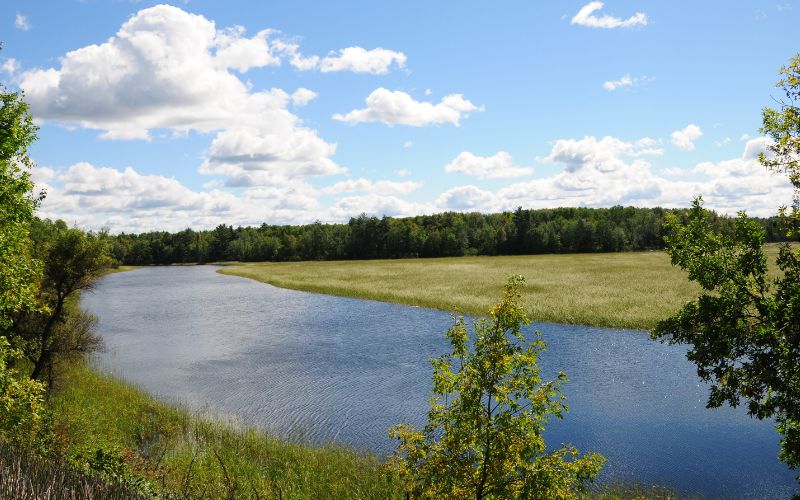
- Details
- By Native News Online Staff
Today, the Leech Lake Band of Ojibwe (LLBO) announced a major advancement in their land restoration efforts as part of the Leech Lake Band of Ojibwe Reservation Restoration Act.
The Chief of the US Forest Service signed a Decision Memo, initiating the transfer of approximately 11,760 acres of federally managed land within the Chippewa National Forest (CNF) into trust for the LLBO.
The lands, originally seized through illegal transfers, are being returned after years of dedicated advocacy by the LLBO. The recent decision affects 345 Restoration Parcels, totaling 11,778.13 acres. According to teh statement from the tribe, the next steps involve publishing legal descriptions in the Federal Register to formalize the land transfer process.
Faron Jackson Sr., Chairman of the LLBO, said in a statement that the move was one of the most significant positive developments for the tribe since the original treaties were signed and the reservation was established in 1855.
“With immense joy and hope for our future, we celebrate this significant step in restoring our illegally transferred lands,” Jackson Sr., said in a statement. “I extend my deepest gratitude to the Forest Service and our Tribal staff for their efforts in making this land transfer a reality.
For more a century, the Leech Lake people have tirelessly worked to reclaim their ancestral lands. The tribe says the restoration not only addresses critical housing needs but also improves access to wild rice beds and restores justice to the community.
The Leech Lake Reservation, created through treaties and executive orders in the mid-1800s, was intended as a permanent home for the Ojibwe people, who had ceded millions of acres to form what is now Minnesota. However, subsequent laws, starting with the Nelson Act of 1889 and continuing with the establishment of the Chippewa National Forest and “Secretarial Transfers” in the 1940s and 50s, resulted in significant land loss and displacement.
This loss has had enduring impacts, perpetuating historical trauma and resentment towards federal agencies, and exacerbating social issues such as homelessness and overcrowding. Currently, less than 5% of the treaty-guaranteed lands remain in trust.
The signing of the Decision Memo culminates decades of effort and advocacy, reaffirming the rights of the Leech Lake Band of Ojibwe and restoring a vital connection to their ancestral lands. This achievement is a significant step forward in addressing the social inequities and injustices endured by the Leech Lake people.
A commemorative ceremony to celebrate this historic land restoration will be held on July 17, 2024, starting at 11:00 AM at the Bug-O-Nay-Ge-Shig School (15353 Silver Eagle Dr NW, Bena, MN 56626). The public is invited to attend and participate in the celebration.
More Stories Like This
50 Years of Self-Determination: How a Landmark Act Empowered Tribal Sovereignty and Transformed Federal-Tribal RelationsMashantucket Pequot Tribal Nation to Host Puneesuwak “Honoring” Our Veterans Event
Lumbee Recognition Debate Rekindled in Senate Hearing
Senate Committee on Indian Affairs to Hear Testimony on Lumbee Tribe Federal Recognition Bill
Ghosts Suppers - Part of Odawa Tradition and Culture Still Alive
Help us tell the stories that could save Native languages and food traditions
At a critical moment for Indian Country, Native News Online is embarking on our most ambitious reporting project yet: "Cultivating Culture," a three-year investigation into two forces shaping Native community survival—food sovereignty and language revitalization.
The devastating impact of COVID-19 accelerated the loss of Native elders and with them, irreplaceable cultural knowledge. Yet across tribal communities, innovative leaders are fighting back, reclaiming traditional food systems and breathing new life into Native languages. These aren't just cultural preservation efforts—they're powerful pathways to community health, healing, and resilience.
Our dedicated reporting team will spend three years documenting these stories through on-the-ground reporting in 18 tribal communities, producing over 200 in-depth stories, 18 podcast episodes, and multimedia content that amplifies Indigenous voices. We'll show policymakers, funders, and allies how cultural restoration directly impacts physical and mental wellness while celebrating successful models of sovereignty and self-determination.
This isn't corporate media parachuting into Indian Country for a quick story. This is sustained, relationship-based journalism by Native reporters who understand these communities. It's "Warrior Journalism"—fearless reporting that serves the 5.5 million readers who depend on us for news that mainstream media often ignores.
We need your help right now. While we've secured partial funding, we're still $450,000 short of our three-year budget. Our immediate goal is $25,000 this month to keep this critical work moving forward—funding reporter salaries, travel to remote communities, photography, and the deep reporting these stories deserve.
Every dollar directly supports Indigenous journalists telling Indigenous stories. Whether it's $5 or $50, your contribution ensures these vital narratives of resilience, innovation, and hope don't disappear into silence.
 The stakes couldn't be higher. Native languages are being lost at an alarming rate. Food insecurity plagues many tribal communities. But solutions are emerging, and these stories need to be told.
The stakes couldn't be higher. Native languages are being lost at an alarming rate. Food insecurity plagues many tribal communities. But solutions are emerging, and these stories need to be told.
Support independent Native journalism. Fund the stories that matter.
Levi Rickert (Potawatomi), Editor & Publisher

